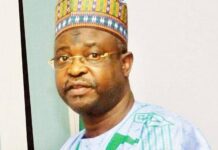By Chris Paul Otaigbe
“Le ton fait la chanson,” (it means that melody is what makes the song and not the loudness of the singer.) he was fond of saying.
Those words captured the character Javier Perez de Cuellar lived while he was with the world. He played the melody of peace, sang in silent tones and the sonority of his voice sent combatants into permanent ceasefires that generated everlasting peace to crisis-ridden countries.
Pérez de Cuellar, the two-term United Nations secretary-general who brokered a historic cease-fire between Iran and Iraq in 1988 and who in later life came out of retirement to help re-establish democracy in his Peruvian homeland, died Wednesday, March 4, 2020. He was 100 years old.
His son, Francisco Pérez de Cuellar, said his father died at home of natural causes. Javier Pérez de Cuellar was “an outstanding Peruvian, a full-bodied democrat, who dedicated his life and work to making our country great,” tweeted Peruvian President Martín Vizcarra.
Perez de Cuellar’s death ends a long diplomatic career that brought him full-circle from his first posting as secretary at the Peruvian embassy in Paris in 1944 to his later job as Peru’s ambassador to France.
When he began his tenure as U.N. secretary-general on Jan. 1, 1982, he was a little-known Peruvian who was a compromise candidate at a time when the United Nations was held in low esteem.
Serving as U.N. undersecretary-general for special political affairs, he emerged as the dark horse candidate in December 1981 after a six-week election deadlock between U.N. chief Kurt Waldheim and Tanzanian Foreign Minister Salim Ahmed Salim.
Once elected, he quickly made his mark.
Disturbed by the United Nations’ dwindling effectiveness, he sought to revitalize the world body’s faulty peacekeeping machinery.
His first step was to “shake the house” with a highly critical report in which he warned: “We are perilously near to a new international anarchy.”
During his decade as U.N. chief, Perez de Cuellar would earn a reputation more for diligent, quiet diplomacy than charisma.
“He has an amiable look about him that people mistake for through and through softness,” said an aide, who described him as tough and courageous.
Faced early in his first term with a threatened U.S. cutoff of funds in the event of Israel’s ouster, he worked behind the scenes to stop Arab efforts to deprive the Jewish state of its General Assembly seat.
There was muted criticism from the Arab camp that he had given the Americans the right of way in the Middle East.
Born on January 19, 1920 in Lima, Javier Pérez de Cuéllar studied in Colegio San Agustín of Lima, and then at Pontifical Catholic University of Peru.
Pérez’s political career began when he joined the Peruvian Ministry of Foreign Affairs, at age twenty, in 1940 and the diplomatic service, four years later, in 1944, serving subsequently as Secretary at the Peruvian embassies in France, where he met and married his first wife, Yvette Roberts who died in Lisbon in 2013. He also served in the United Kingdom, Bolivia and Brazil, as well as Counselor and Minister Counselor at the embassy in Brazil.
He would later serve as ambassador to Switzerland, the Soviet Union, Poland, and Venezuela. From his first marriage, he had a son, Francisco, born in Paris, and a daughter, Águeda Cristina, born in London.
He returned to Lima in 1961, and was promoted to the rank of Ambassador the following year. In 1966, he was appointed Secretary-General (Deputy Minister) for Foreign Affairs. In 1981, he served as Legal Adviser in the Ministry of Foreign Affairs. Pérez de Cuellar has served as Ambassador of Peru to Switzerland, the Soviet Union, Poland and Venezuela.
A member of the Peruvian delegation to the first session of the United Nations General Assembly in 1946 and the twenty-fifth to thirtieth sessions of the Assembly. In 1971, Perez was appointed Permanent Representative of Peru to the United Nations, and he led his country’s delegation to all sessions such as the Security Council, and served as President of the Council of the Assembly from then until 1975.
He served as President at the time of the events in Cyprus in July 1974. On September 18, 1975, he was appointed Special Representative of the Secretary-General in Cyprus, a post he held until December 1977, when he rejoined the Peruvian Foreign Service.
On October 29, 1975, in Cyprus, Mr. Pérez de Cuéllar married his second wife, the former Marcela Temple Seminario (August 14, 1933, – July 3, 2013) with whom he had no children.
In 1975, he was appointed Special Representative of the Secretary-General in Cyprus, a post he held until December 1977, when he rejoined the Peruvian Foreign Service.
On February 27, 1979, he was appointed United Nations Under-Secretary-General for Special Political Affairs.
On December 31, 1981, Pérez de Cuéllar succeeded Kurt Waldheim as the fifth Secretary-General and was re-elected for a second term in October 1986.
In that capacity, he visited Pakistan and Afghanistan in April and August of that year in order to continue the negotiations initiated by the Secretary-General some months earlier.
Later that year, he again rejoined Peru’s Ministry of Foreign Affairs but continued to represent the Secretary-General in Afghanistan.
Pérez de Cuellar assumed the office of Secretary-General of the United Nations in January 1982 and was appointed for a second term in 1987, after a groundswell of support for his candidacy, including a conversation with President Ronald Reagan, who, in the words of the U.N. Chief’s spokesman, expressed “his personal support for the secretary-general.
He served until 1991.
Just about all the Western countries told him they would like to see him stay on. “There is no visible alternative.” Said a Western diplomatic source.
During his two terms, he led mediations between Britain and Argentina in the aftermath of the Falklands War and promoted the efforts of the Contadora Group to bring peace and stability to Central America.
He brokered the historic ceasefire between Iran and Iraq in the 1988 war at the UN which turned out to be his greatest triumph as an understated UN chief. However, despite his engagement in “shuttle” diplomacy he failed to stop the Falklands war after Argentina invaded the British territory in April 1982.
According to him, he said he had been unable to reach a peace deal after it became clear that neither side would change their positions.
He also interceded in the negotiations for the independence of Namibia, the conflict in Western Sahara between Morocco and the Polisario Front, the war between Croatian forces seeking independence and the Yugoslav federal as well as local Serb forces, and the Cyprus issue.
He also presided over an international arbitration committee that ruled on the Rainbow Warrior incident between New Zealand and France in 1986.
Three years earlier, in 1983, he initiated the World Commission on Environment and Development (WCED) in order to unite countries to pursue sustainable development.
Shortly before the end of his second term, he rejected an unofficial request by members of the Security Council to reconsider his earlier decision not to run for a third term, shortened to two years, as a search for his successor had not, as of then, yielded a consensus candidate. A candidate was found in late December 1991, and his second term as Secretary-General concluded, as scheduled, on December 31, 1991.
Unlike his predecessor, Kurt Waldheim who was regarded as a “workaholic” and who spent long hours in his office, Perez de Cuellar liked to get away from it all. As one of his close Aides said, Perez was very jealous of his own privacy.
“When I can, I read everything but United Nations documents,” Perez de Cuellar confided to a reporter. Once on a flight to Moscow, an aide observed that in the midst of it all, the secretary-general had time for splendid literature.
All told, Perez de Cuellar’s diplomacy helped bring an end to fighting in Cambodia and the 1980-88 Iran-Iraq war, and the withdrawal of Soviet troops from Afghanistan.
Pérez de Cuéllar’s life spanned the entire history of the United Nations, Guterres said, dating back to his participation in the first meeting of the general assembly in 1946 as a junior diplomat.
When he began his tenure as in the top job in 1982, he was a little-known figure who had risen as a compromise candidate at a time when the United Nations was held in low esteem.
But once elected, he quickly made his mark and sought to revitalize the world body’s faulty peacekeeping machinery.
His first step was to “shake the house” with a highly critical report in which he warned: “We are perilously near to a new international anarchy.”
With the 1982 Israeli invasion of Lebanon, and the raging conflicts in Afghanistan and Cambodia and between Iran and Iraq, he complained to the general assembly that UN resolutions were increasingly defied or ignored by those countries that believed they were strong enough to do so.
“The problem with the United Nations is that either it’s not used or misused by member countries,” he said in an interview at the end of his first year as UN secretary general.
During his decade as UN chief, Pérez de Cuéllar earned a reputation more for diligent, quiet diplomacy than charisma.
“He has an amiable look about him that people mistake for through and through softness,” said an aide, who described him as tough and courageous.
Faced early in his first term with a threatened reduction of funds from the US in the event of Israel’s ouster from the UN, he worked behind the scenes to stop Arab’s efforts to deprive the Jewish state of its general assembly seat.
There was muted criticism from the Arab camp that he had given the Americans the right of way in the Middle East.
In dealing with human rights issues, he chose the path of “discreet diplomacy”, refraining from publicly rebuking Poland for refusing to allow his special representative into the country to investigate allegations of human rights violations during the Warsaw regime’s 1982 crackdown on the Solidarity trade union movement.
The Peruvian spent much of his second term working behind the scenes on the hostage issue, resulting in the release of westerners held in Lebanon, including Briton John McCarthy and the American journalist Terry Anderson.
He could add a list of other achievements by the end of his second term in 1991, including ushering in the independence of Namibia, an end to the Iran-Iraq War, the peace accord in Cambodia and, in his very last days in office, a historic peace agreement in El Salvador.
Shortly after midnight on Jan. 1, 1992, he walked out of U.N. headquarters to his waiting limousine, no longer the secretary-general, but having attained his final goal after hours of tough negotiations: a peace pact between the Salvadoran government and leftist rebels.
After leaving the UN, Pérez de Cuéllar made an unsuccessful bid for Peru’s presidency in 1995 against the authoritarian leader Alberto Fujimori, whose 10-year autocratic regime crumbled in November 2000 amid corruption scandals. In 2000, he emerged from retirement to take on the mantle of Peruvian foreign minister and cabinet chief for provisional president Valentin Paniagua.
His impeccable democratic credentials lent credibility to an interim government whose mandate was to deliver free and fair elections. Eight months later, newly elected President Alejandro Toledo asked him to serve as ambassador to France.
Trilingual, Perez de Cuellar read French, English and Spanish literature
A Peruvian politician and diplomat who served as the fifth Secretary-General of the United Nations from January 1, 1982 to December 31, 1991, Perez ran unsuccessfully against Alberto Fujimori for President of Peru in 1995 and following Fujimori’s resignation over corruption charges, he was elected Prime Minister and Minister of Foreign Affairs from November 2000 until July 2001.
In September 2004, he stepped down from his position as Peru’s Ambassador to France, where he formerly resided. He was also a member of the Club de Madrid, a group of more than 100 former Presidents and Prime Ministers of democratic countries, which works to strengthen democracy worldwide.
Ufologist Bud Hopkins alleged that Pérez de Cuéllar was a witness and key figure in the 1989 Manhattan UFO incident involving Linda Napolitano.
On August 30, 2017, as a follow up to the Black Swan Project, Spanish naval authorities salvaged the artillery remains of the frigate Nuestra Señora de las Mercedes which had sunk in 1804 and two of whose bronze cannons, weighing between two and three tonnes each, had been cast in Lima by Sevillian smelter Bernardino de Tejeda.
Two of Tejeda’s direct descendants and the members of the 1942 team in charge of the restoration of his sepulchral crypt were the future Peruvian Ambassadors Carlos Pérez Cánepa Jimenez and Pérez de Cuéllar, then 24 and 22 years old respectively.
He was the recipient of numerous Doctorates Honoris Causa, receiving honors and decorations from some 25 countries.
Some of his awards include:
· 1992: Freedom medal
· National University of San Marcos Honorary Doctorate
· Pontifical Catholic University of Peru
· University of Lima
· Journalistic prize Golden Doves for Peace issued by the Italian Research Institute Archivio Disarmo
· US Presidential Medal of Freedom awarded in 1991 by George H.W. Bush, under section Other Political Figures.
· Member, Inter-American Dialogue
· Jawaharlal Nehru Award
He was the author of Manual de Derecho Diplomatico (1964).
He suffered a heart attack on July 22, 2005 and was admitted to a hospital in Paris, where he was released, eight days later, on July 30. On June 19, 2017.
With a lifespan of 35,581 days, he surpassed Alfredo Solf y Muro (1872–1969) in terms of longevity and was the oldest former Prime Minister in Peru’s history.
His son, Francisco Pérez de Cuéllar, said his father died at home of natural causes. The current UN secretary-general, Antonio Guterres, called the Peruvian diplomat a personal inspiration.
In July 1986, Pérez de Cuéllar underwent a quadruple coronary bypass operation, putting in question his availability for a second term. From the outset, Pérez de Cuéllar had insisted that he would be a one-term secretary-general but he was persuaded by support from western countries to stay on.
Born to a father who was “modest businessman”, was an accomplished amateur pianist, according to the former secretary-general. The family traced its roots to the Spanish town of Cuéllar, north of Segovia.
At the age of 100 years, 45 days, Pérez de Cuéllar was both the oldest living former Peruvian prime minister and Secretary General of the United Nations, until his death.
His heart for his job and agenda for achieving global peace is captured in the message he delivered at the 1985 edition of the UN Day: “When leaders of nations engage themselves earnestly in examining the outcome of international effort over four (over seven) decades and formulating its requirements for the future, it is a sign at least of astrong current of internationalism running through all societies. It implies a recognition of the interdependence of nations and the essentiality of a multilateral approach to the solution of global problems.”










